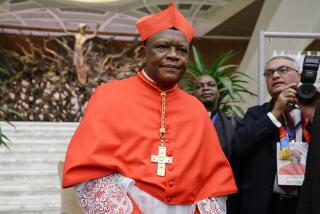Anglican Takes America to Task
The archbishop of Canterbury strongly suggested Monday that apologies from the U.S. Episcopal Church for creating a controversy by ordaining a gay bishop had not gone far enough to heal a breach in the worldwide Anglican Communion, and called on the American church to repent.
The spiritual head of Anglicanism also appeared to direct criticism at conservative bishops in Africa and South America who violated church laws by claiming jurisdiction over U.S. parishes that disagreed with their church’s stands on homosexuality. The Episcopal Church is the American wing of the Anglican Communion.
In calling for repentance on both sides, Archbishop of Canterbury Rowan Williams was more forceful than the recommendations made last month by a panel that examined how the 77-million-member Anglican Communion could maintain unity in the face of the Episcopal Church’s elevation last year of a gay priest as bishop of New Hampshire.
The panel’s findings, known as the Windsor Report, merely invited the U.S. church to express “regret” that its actions had caused consternation in many parts of the Anglican Communion. It also invited Americans to undertake a self-imposed moratorium on similar ordinations in the future.
But Williams said Monday that apologies were not enough, taking the position expressed earlier by several irate African bishops who demanded that the U.S. church repent.
Williams did not spell out whether he hoped the U.S. church would cease ordaining actively gay men and lesbians as bishops. However, in church theology, repentance is understood to mean more than an apology. It means endeavoring not to commit the same offense again, or what the church calls “amendment of life.”
“An apology may amount only to someone saying, ‘I’m sorry you feel like that,’ and that doesn’t go deep enough,” Williams wrote in a letter to the leaders of national Anglican churches to mark the beginning of Advent, the period of repentance before Christmas.
“If it is true that an action by one part of the Communion genuinely causes offense, causes others to stumble, there is need to ask, ‘How has what we have done got in the way of God making himself heard and seen among us?’ ” Williams wrote. “Have we bound on other churches burdens too heavy for them to bear, reproaches for which they may suffer? Have we been eager to dismiss others before we have listened?”
In the same letter, Williams underscored the Communion’s stance against homophobia, admonishing church leaders not to use “any words that could make it easier for someone to attack or abuse a homosexual person.” A gay man was recently killed in a brutal attack near the archbishop’s London residence.
Since the Anglican Communion consists of self-governing national churches, Williams does not have the authority to enforce his views. However, several national churches have reduced or cut ties to the American church since the ordination of the Rt. Rev. V. Gene Robinson as bishop of New Hampshire last November.
Williams’ letter was expected to increase the stakes when U.S. bishops meet in January in Salt Lake City to draft a formal response to the Windsor Report. Anglican leaders are scheduled to consider the report when they meet in Northern Ireland in February.
Church officials who have closely followed developments said that although Williams did not specifically name the U.S. church in his letter, he clearly had in mind Robinson’s ordination.
“It’s a strong challenge to North American leadership, but it’s also a strong challenge to the whole Communion,” said the Rev. Canon Kendall S. Harmon, a theologian in the Episcopal Diocese of South Carolina who frequently speaks on behalf of U.S. conservatives.
The Rev. Canon Ian Douglas, professor at the Episcopal Divinity School in Cambridge, Mass., said Williams was “asking all of us to repent of the fact that we believe and function as if we’re self-directed, autonomous individuals and churches.” Williams, in his letter, acknowledged the U.S. church’s autonomy but cautioned it against controversial decisions that burdened other churches.
The head of the U.S. Episcopal Church, Presiding Bishop Frank T. Griswold, who was on a pastoral visit in Hawaii, had no immediate comment, his New York office said.
More to Read
Sign up for Essential California
The most important California stories and recommendations in your inbox every morning.
You may occasionally receive promotional content from the Los Angeles Times.










